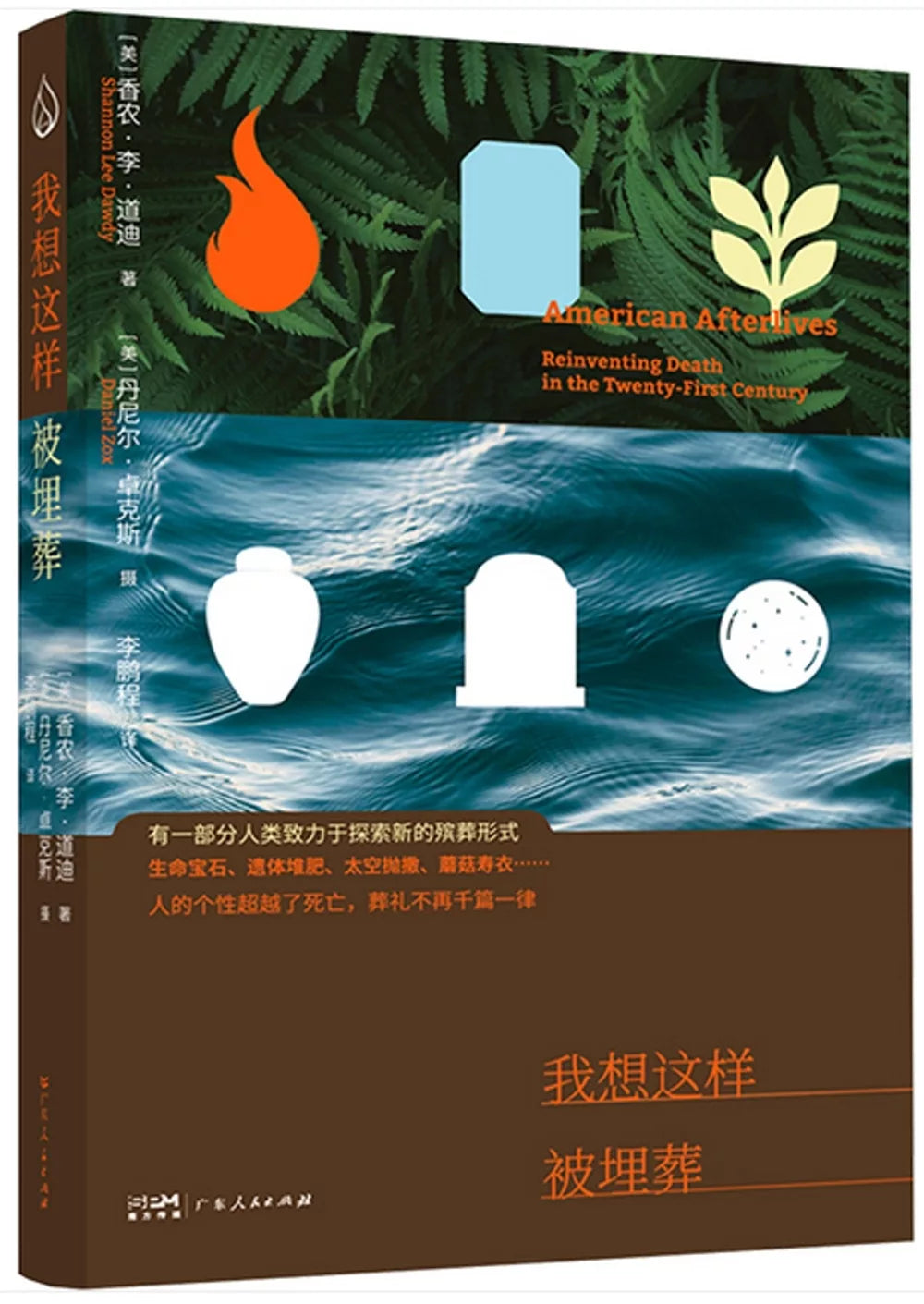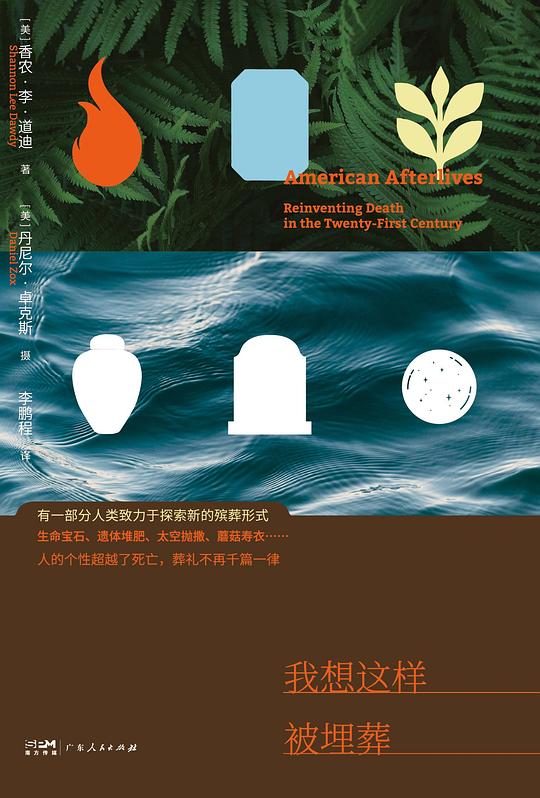1
/
of
2
I want to be buried like this
I want to be buried like this
[US] Shannon Lee Dowdy , [US] Photographed by Daniel Drokes Li Pengcheng 译
Regular price
$18.99 USD
Regular price
Sale price
$18.99 USD
Unit price
/
per
Low stock
Couldn't load pickup availability
About Book
About Book
American Afterlives: Reinventing Death in the Twenty-First Century
📣Honorable nomination for the 2022 Victor Turner Ethnographic Writing Award📣Death can be a sexy thing📣A five-year field study, anthropologists broke into the turbulent funeral industry📣Body composting, mushroom shrouds, remains jewelry...📣A "death revolution" is taking place in the United States————————
【Editor's Recommendation】
❓How would you like your body to be disposed of?
❓ What kind of funeral would you like to say goodbye to the world?
❓Personalized funerals are becoming increasingly popular. How have people’s attitudes towards the body and death changed as they reshape funerals?
⭐A five-year field investigation: When anthropologists broke into the turbulent funeral industry, body composting, mushroom shrouds, and remains jewelry...
In the face of death, we use our imagination to fill the void; by reimagining death, we imbue life with new meaning. This 21st-century ethnography, captured through five years of nationwide fieldwork in the funeral industry, confronts the revolution in contemporary understanding of life and death.
⭐Don't give up the last chance to show your individuality, a wave of value change that emerges at the funeral
People in the 21st century are keen to invent their own funerals, breaking through the boundaries of generations and species through the rituals of the passing of life, and truly expressing their identity positioning and desire.
The bereaved families who have been disturbed by death must also take back the family autonomy of the funeral, break through the pretense with true love, and weave a new bond to continue the relationship between the living and the deceased.
In an era of industrialized corpse disposal, the social undercurrent of funeral transformation also foreshadows a wave of changes in beliefs and values.
————————
【Content Introduction】
America is quietly undergoing a death revolution. You can choose from new methods of disposing of your body, including cryonics, water burial, composting, and mushroom shrouds. Your family and friends can create jewelry, glass balls, and works of art to keep you company. You can be buried in scenic garden cemeteries, lawn cemeteries, and rural cemeteries, or have your ashes scattered beneath thousand-year-old redwood trees, or even released into space. Home funerals and green burials are also on the rise, and people are increasingly concerned about the environmental impact of body disposal. In America today, death is being reshaped on three levels: the disposition of remains, new rituals, and the concept of the afterlife.
A society's treatment of the dead offers powerful clues to its beliefs and values. Funerals, as social activities, are also a key component of human connection. Shannon Lee Dawdy, Professor of Anthropology at the University of Chicago, focuses on the American funeral revolution. As an anthropologist, she immerses herself in the turbulent world of the funeral industry. She speaks with funeral directors, embalmers, designers, cemetery owners, death doulas, entrepreneurs, and bereaved families, documenting the rapidly changing attitudes toward death in contemporary America: People are reluctant to give up this last opportunity to express their individuality, and finding the most appropriate funeral arrangements for themselves (or for their loved ones) has become a final desire. A well-planned funeral has immeasurable power to heal the pain of loss for loved ones.
"I Want to Be Buried Like This" comprehensively and objectively chronicles the details of this death revolution, deeply analyzing the social factors and psychological mechanisms driving this change. Dowdy finds that by innovating funeral customs, Americans are reshaping their views on personhood, ritual, and intergenerational relationships. While funeral businesses seek new business opportunities between pursuing profits and caring for humanity, they also face a seemingly contradictory problem: contemporary people's views on death are becoming both more materialistic and more spiritual.
————————
【Celebrity Recommendation】
(Dowdy) is a curious anthropologist and a gifted storyteller.
—Andrei Codrescu
Death is hardly a sexy thing, but Shannon Lee Dowdy does it in her brilliant new book, which explores the changing nature of American funeral practices and, through that, reflects on the state of American society today. Dowdy's writing is playful and sometimes experimental... This is a book about a difficult subject, but it's also incredibly imaginative and captivating.
—Mara Buchbinder, American Ethnologist This is an impressive and deeply moving piece of scholarship. Shannon Lee Dowdy brings us this book, drawn from her travels across America. Its exploration of the material and the metaphysical illuminates a new American understanding of death, the handling of the body, and the afterlife.
—Matthew Engelke, author of "How to Think Like an Anthropologist." This is truly delightful reading. Through "I Want to Be Buried Like This," we hear the author's voice as she examines how contemporary Americans approach and understand death with compassion and genuine curiosity. The book reads like a love letter, capturing not only individual figures but also the fragile and wild American grassroots.
—Leva Nelson Stutz, co-editor of The Oxford Handbook of the Archaeology of Death and Burial "We historians can only imagine how people in the past faced death, offering rich, multi-layered, reflective interpretations of it, but Shannon Lee Dowdy does just that for death in the present and in the future. As our descendants seek to understand cultural shifts in early 21st-century America, they will return to this book."
—Thomas W. Larquer, The Work of the Dead: A Cultural History of Mortal Remains “The author is brilliant… This Is How I Want to Be Buried introduces a remarkable array of ways to celebrate and remember death.
—Glenn C. Altshuler, Psychology Today magazine. This book is the best social science work on death since Death in America, a remarkable fusion of profound anthropological reflection and astute field research. Through story after story, the author takes us on a journey of spiritual purification, and the final theoretical reflections are truly moving. Confucius said, "If you do not know life, how can you know death?" But without seriously contemplating death, we cannot truly understand the meaning of life.
—Li Junpeng (Professor at the School of Social Sciences, Central China Normal University, and Editor-in-Chief of International Sociological Reviews)
Publication Date
Publication Date
2025-01-01
Publisher
Publisher
广东人民出版社
Imprint
Imprint
Yuefu Culture
Pages
Pages
339
ISBN
ISBN
9787218174846
share



